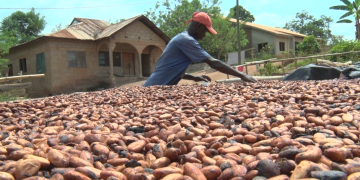A Ghanaian educator Nana Yaa (not her real name) has voiced concern over a recent shift in Ghana’s education assessment approach, arguing that it jeopardizes the quality and fairness of student evaluations on Social media video post post on X.
The educator, whose views reflect a growing disquiet among stakeholders, highlights that the Ghana Education Service (GES) has moved from a curriculum-based grading system to a comparative or competitive grading model.
According to her, this shift undermines the core purpose of grading and compromises the true measure of student performance.
In a curriculum-based grading system, student assessments are based on fixed standards outlined in the curriculum. Historically, a student earning 80% in an exam would, for instance, receive an “A” or equivalent mark, while those achieving 70% might be awarded a “B”.
This approach allows students to be assessed objectively according to set academic criteria, which is widely considered to reflect individual achievement and mastery of the subject matter.
In contrast, the new competitive grading approach ranks students based on their performance relative to peers. With this method, the highest-scoring student sets the benchmark, and other students’ grades are assigned in descending order.
For instance, if the highest score in an exam is 70%, that score might set the threshold for an “A” grade, and subsequent grades would be assigned based on how other students’ scores compare to this top score.
The educator warns that comparative grading may distort true academic standards, creating the impression that students are performing well when, in fact, overall scores might be lower than what would traditionally be considered satisfactory.
“I cannot understand why we would abandon curriculum-based grading, which gives a true picture of student learning, in favor of this competitive model,” she said. “Unless, perhaps, the educational system is performing so poorly that it has become impossible to evaluate students against set standards.”
She further argues that competitive grading is generally more suited to contexts outside traditional academic education, such as certain corporate or performance-based environments.
In a traditional educational setting, she insists, students benefit most from a curriculum-based assessment that rewards their individual progress and understanding of the material rather than ranking them solely on relative achievement.
The educator’s concerns echo a broader debate on the suitability of competitive grading in academic institutions, especially where it may lower educational standards and obscure true academic progress.
She cautions that such practices could have a long-term impact on students, potentially leaving them underprepared for both advanced studies and professional environments that expect a thorough understanding of academic fundamentals.
This shift in assessment comes amid calls for the GES to improve the quality of Ghana’s education system, which has faced challenges in aligning with global standards. The educator urges the GES to reconsider its assessment methods and to ensure that Ghana’s students are evaluated in a way that reflects their real capabilities, rather than their relative standings among peers.
The Ghana Education Service has yet to respond to these concerns, but the issue has sparked discussion among teachers, parents, and education experts alike. Many are eager to see how the GES will address the matter and whether it will reconsider the recent changes to the grading system.
Source: www.kumasimail.com



































































